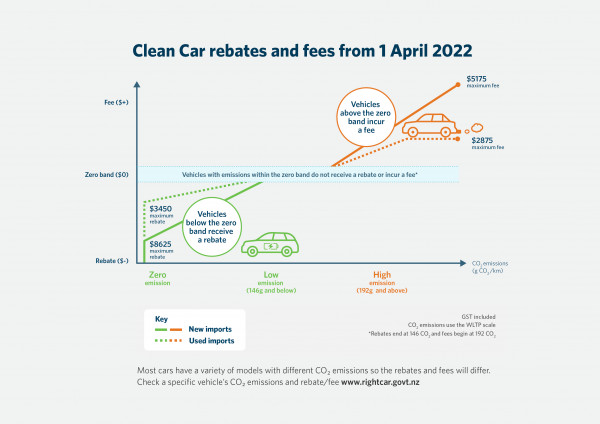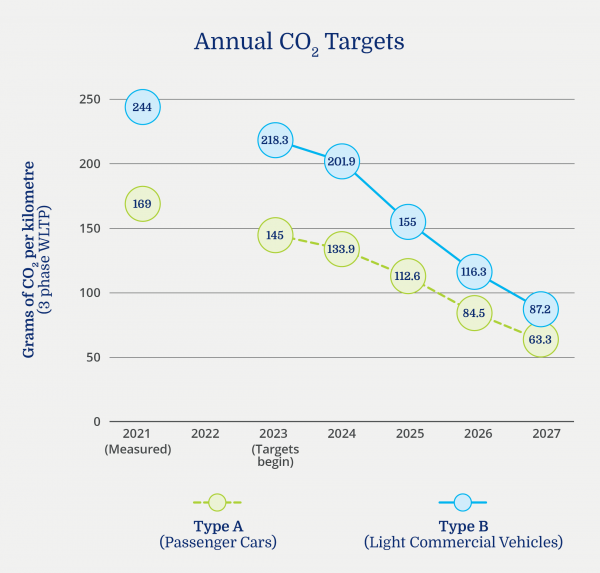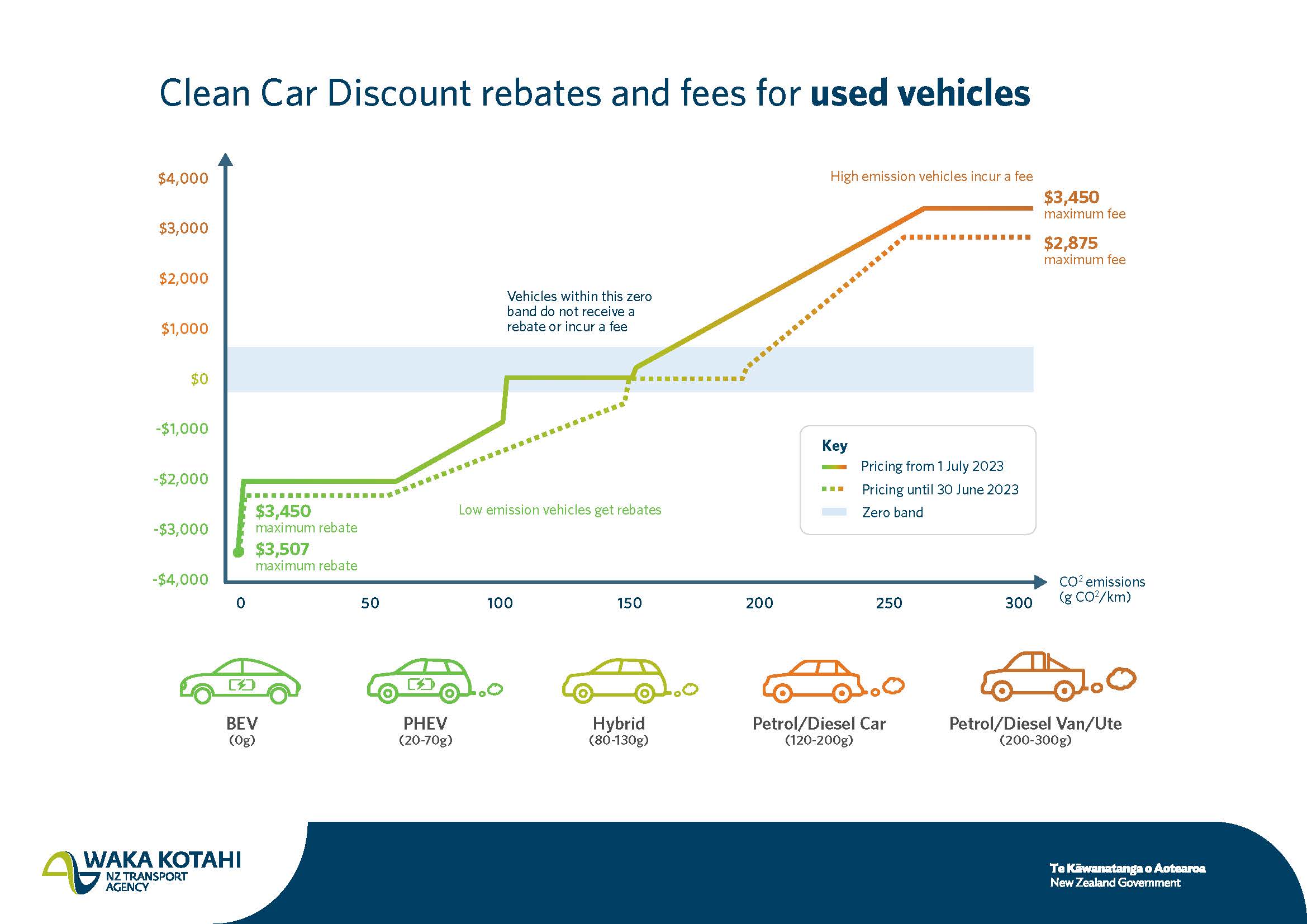What you need to know
Transport emissions are the fastest growing source of greenhouse gas emissions in New Zealand and account for 20% of all the emissions we produce. Nearly 70% of all transport CO2 emissions are from cars, SUVs, utes, vans and light trucks.
We need to significantly improve their fuel efficiency and reduce their emissions in order to achieve net zero CO2 emissions by 2050. The Clean Car Standard will ensure our market has a good supply of low and zero CO2 emission light vehicles with up-to-date technology for New Zealanders to buy.
This work forms part of wider set of transport-related climate response actions under the Government’s Emission Reduction Plan.
Each month we publish a range of information that shows the progress of these polices. These include:
- Electric and hybrid light vehicle registrations
- Light motor vehicle registrations (including average CO2 emissions)
Are you a vehicle importer? You may be interested in the Clean Car Standard forecasting tool.
The work to date
Proactive release 11 July 2024
These documents relate to the Government’s decisions on the outcome of the review of the Clean Car Importer Standard. These decisions included setting the Standard’s annual CO2 targets for 2025–2029.
Repeal of the Clean Car Discount scheme
The Government has passed legislation repealing the Clean Car Discount scheme by 31 December 2023.
The Clean Car Discount started in 2021 to provide rebates and charges based on carbon emissions for new and used vehicle imports. Repealing the scheme means that:
- charges end for all vehicles registered after 11.59 pm on 31 December 2023
- rebate applications will also close after 11.59 pm on 31 December 2023.
The relevant legislation is found at the Land Transport (Clean Vehicle Discount Scheme Repeal) Amendment Act 2023.
Proactive release 17 October 2023
These relate to Clean Car Discount policy changes which came into effect July 2023.
Changes to the Clean Car Discount agreed for 1 July 2023
Due to the increased popularity of zero and low emission vehicles purchases, Clean Car Discount rebates and charges will change for vehicles registered from 1 July 2023.
Proactive release 28 October 2022
Below are the documents proactively realeased on the 28th of October 2022
Amendment to the Ministerial Direction
Under section 103 of the Crown Entities Act (CEA) 2004 the Minister of Transport directed the New Zealand Transport Agency to give effect to government policy in the administration of rebates under the Clean Vehicle Discount Scheme.
Proactive release 19 January 2023
Below are the documents proactively realeased on the 19th of January 2023.
Clean Car Discount Announced
The Government has announced new measures to take action on reducing transport emissions to help meet New Zealand’s 2050 carbon neutral target.
Clean Vehicles Act Passed
The Clean Car Standard and Clean Car Discount were announced in 2021 but aspects weren’t able to be confirmed or enforced until the Clean Vehicles Act came into force in February 2022. The Clean Vehicles Act primarily amends the Land Transport Act 1998 and Land Transport Management Act 2003.
The Clean Car Discount Scheme -- encourages demand for low and zero emission vehicles.
From 1 April 2022, charges will be imposed on high emitting vehicles, and rebates given to low-emitting ones. This will be done on a sliding scale. This is an expansion of the Discount Scheme that started on 1 July 2021 and provided rebates to buyers of battery electric and plugin-hybrid vehicles.
Charges on high emission vehicles act as a purchase disincentive and will fund rebates for zero and low emission vehicles. Vehicles with neither very low nor high emissions will not be subject to rebates nor charges (explained in the graphic below).
- More information for consumers and vehicle dealers is available from the Waka Kotahi Clean Car Website. This includes an online form to apply for a clean car rebate.
- The RightCar website provides a searchable database of vehicles by type, make, model, or number plate. This allows you to look up the CO2 emissions, and what rebate or charge could apply to different vehicles, if you become the first registered owner of that vehicle.
- The applicable charges, and vehicles excluded from the charges are set out in the Clean Vehicle Discount Scheme Charges Regulations which come into force on 1 April 2022.

The Clean Car Standard -- encourages supply of low and zero emission vehicles.
Part 13 of the Land Transport Act 1998 (as amended by the Clean Vehicles Act) sets out the legislative framework for the Clean Vehicle Standard, including:
- Targets for reducing CO2 emissions – CO2 targets for vehicle importers apply from 2023 and will strengthen significantly each year through to 2027. CO2 targets for 2028 and later years may be set later by regulation.
- Charges – imposed on vehicle importers who fail to achieve targets, and which rise over time.
- Banking, borrowing, and transferring CO2 – limited methods that a vehicle importer can avoid charges if they cannot reach their CO2 target
- Variations by vehicle type and weight - stricter targets apply for passenger cars than do for commercial vehicles (utes and vans). The Clean Vehicle Standard 2022 Regulations were made on 1 November 2022 and prescribe formulas for the weight adjustment of targets, specify the types of vehicles excluded from the policy, and other details related to CO2 accounts.
- Compliance regimes – importers can either be assessed on an annual or per-vehicle basis.
- Timing - from December 2022, importers of vehicles must have a CO2 account with Waka Kotahi in order to progress vehicles through entry certification. This ensures systems are in place to monitor importers against targets from January 2023.
- The Land Transport (Clean Vehicles) Amendment Act (No 2) passed on 25 November 2022 and provides a 6-month phase-in period for charges and transfers, and, clarifies that motorcycles and mopeds are not part of the Clean Car Standard.
- More information for vehicle dealers is available from the Waka Kotahi Clean Car Standard Webpage.”

Other legislative changes
- Testing - the new Vehicle Efficiency and Emissions Data Rule prescribes how tailpipe CO2 emissions for vehicles are to be determined from 1 April 2022.
- Labelling – the Vehicle Energy Economy Label regulation requires that CO2, any rebate/fee, and other information be displayed both physically and online on vehicles for sale by motor vehicle traders from April 2022.
Further Information
- The Initial Briefing to Select Committee is a key document explaining the purpose and design of the policy and associated legislation.
- The Departmental Report to Select Committee summarises public feedback on the Bill and other matters to improve the legislation.”.
- The Land Transport (Clean Vehicles) Amendment Bill details the legislative progress, including speeches, debates, public submissions, and reports.
- The Land Transport (Clean Vehicles) Amendment Act 2022 is the final form of the legislation.
- The Land Transport (Clean Vehicle Discount Scheme Charges) Regulations 2022 contains the detail of the Clean Car Discount.
- The Land Transport (Clean Vehicle Standard) Regulations 2022 contains the detail of the Clean Car Standard
- The Land Transport Rule: Vehicle Efficiency and Emissions Data 2022 prescribes efficiency and emissions data requirements for vehicles entering New Zealand and replaces the earlier Fuel Consumption Information Rule.
- The Energy Efficiency (Vehicle Energy Economy Labelling) Amendment Regulations 2022 prescribe information that motor vehicle traders must display when offering motor vehicles for sale.
- Inland Revenue has issued tax advice on the Clean Car policies.
- Clean Car Discount Fee/Rebate Calculator.
- Clean Car Standard Forecast tool for importers.
- The ICCT has produced a comparison of New Zealand’s CO2 targets against those of other countries and an assessment of their feasibility.
- Comparison of Vehicle CO2 targets compiled January 2022 by The ICCT Source Data
- Comparison of Electric Vehicle sales market share in various key markets 2010 to 2022.
Cabinet decisions on the changes sought by the vehicle industry to the proposed Clean Car Standard
Introduction of carbon dioxide emission standard for imported new and used light vehicles announced
The Government agreed to introduce the Clean Car Standard – a Co2 emissions standard for imported new and used light vehicles. We expect legislation to implement the Clean Car Standard will be introduced in 2021, with the policy taking effect in 2022, although fees on suppliers will not apply until the beginning of 2023
Clean Car Standard and Discount consultation
We consulted on the 2 proposals in July and August 2019. The Clean Car Standard is a vehicle carbon dioxide standard, or fuel efficiency standard. It would require vehicle importers to lower the carbon dioxide emissions of the vehicles they are importing. The Clean Car Discount is a feebate scheme that would make low emission vehicles, like electric vehicles and petrol hybrids, more affordable for Kiwis to buy.


